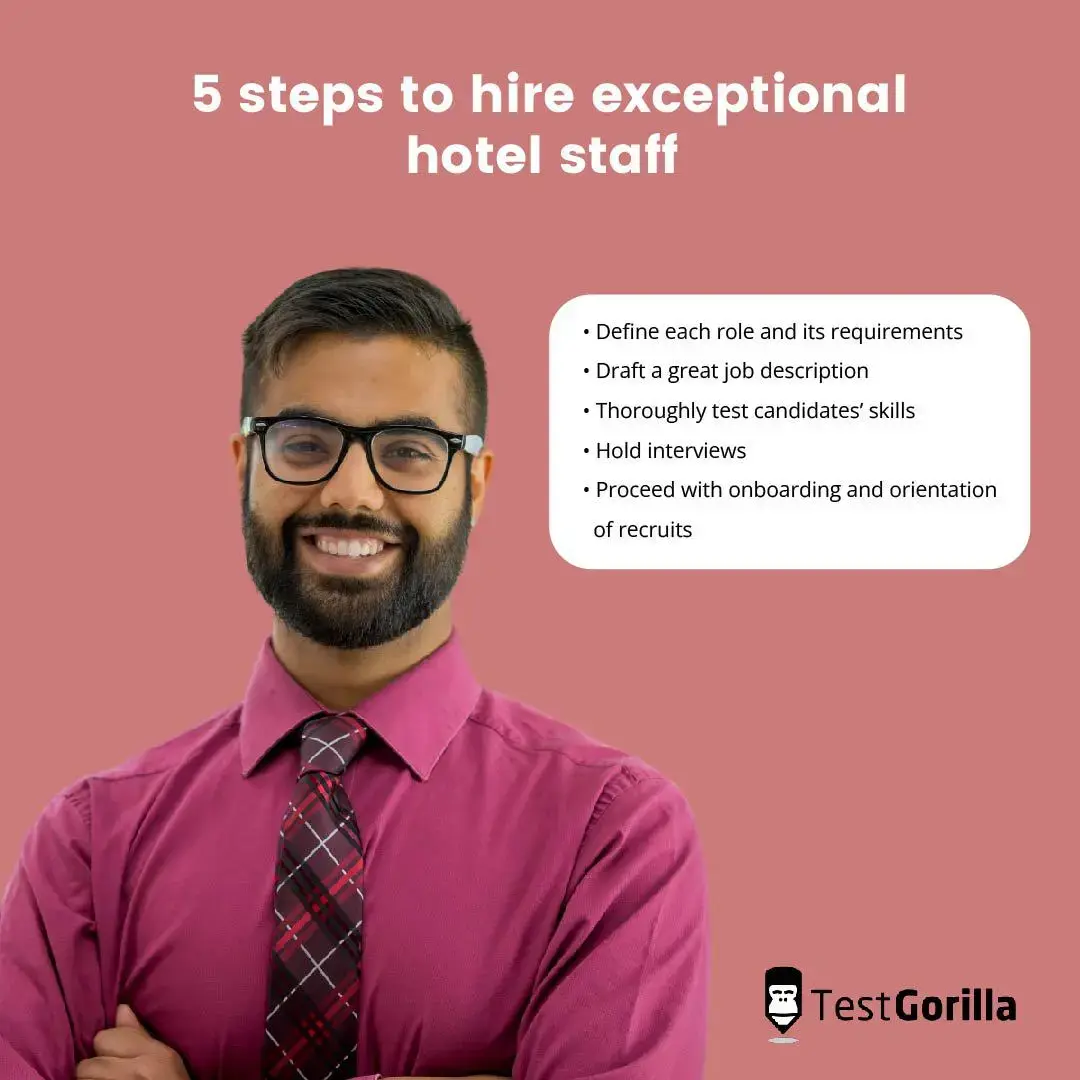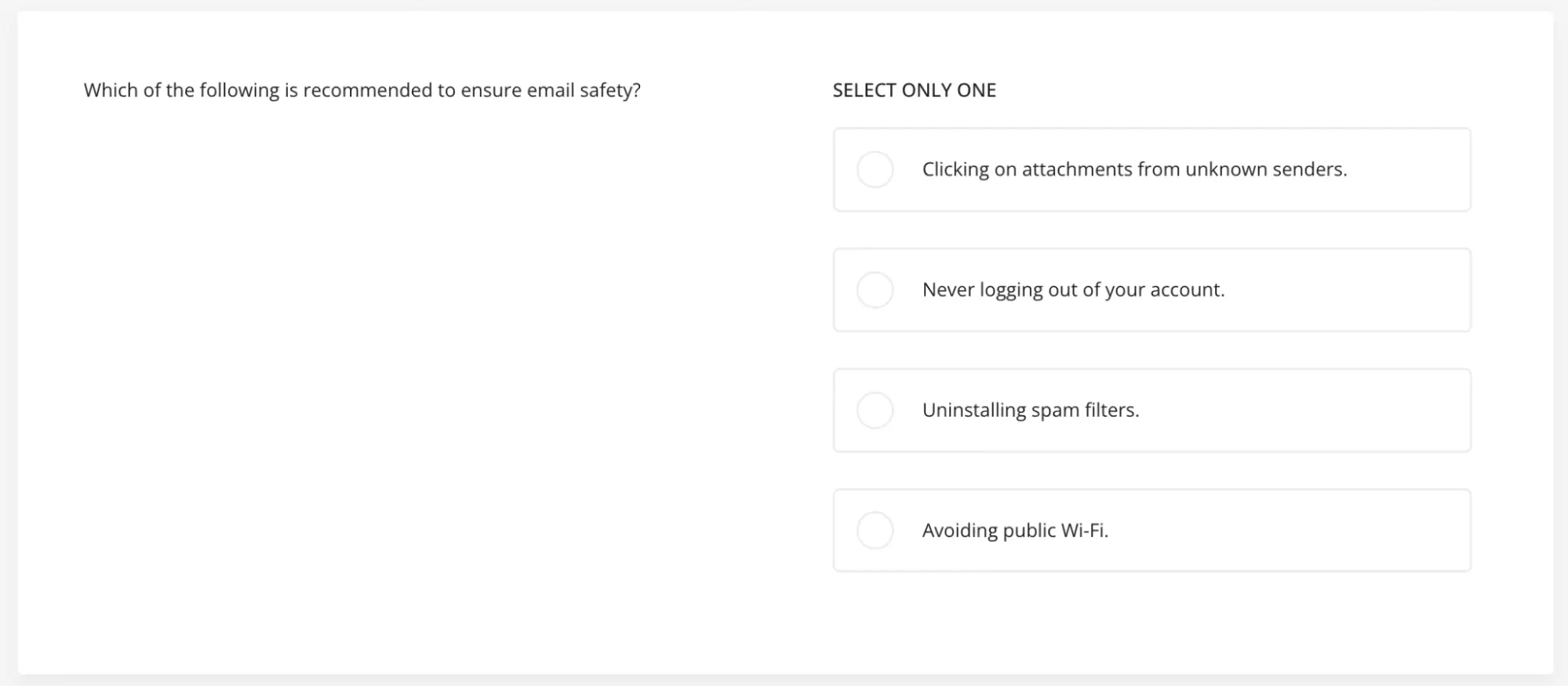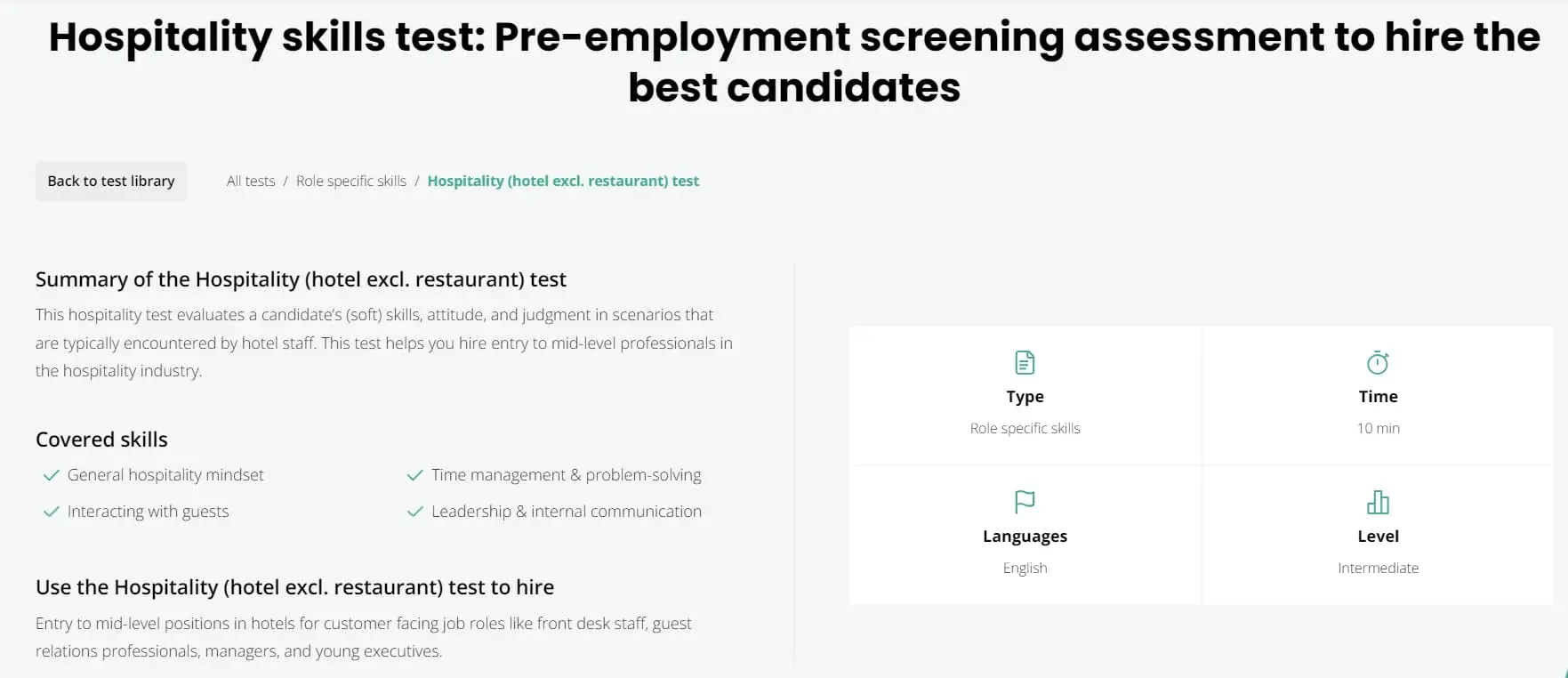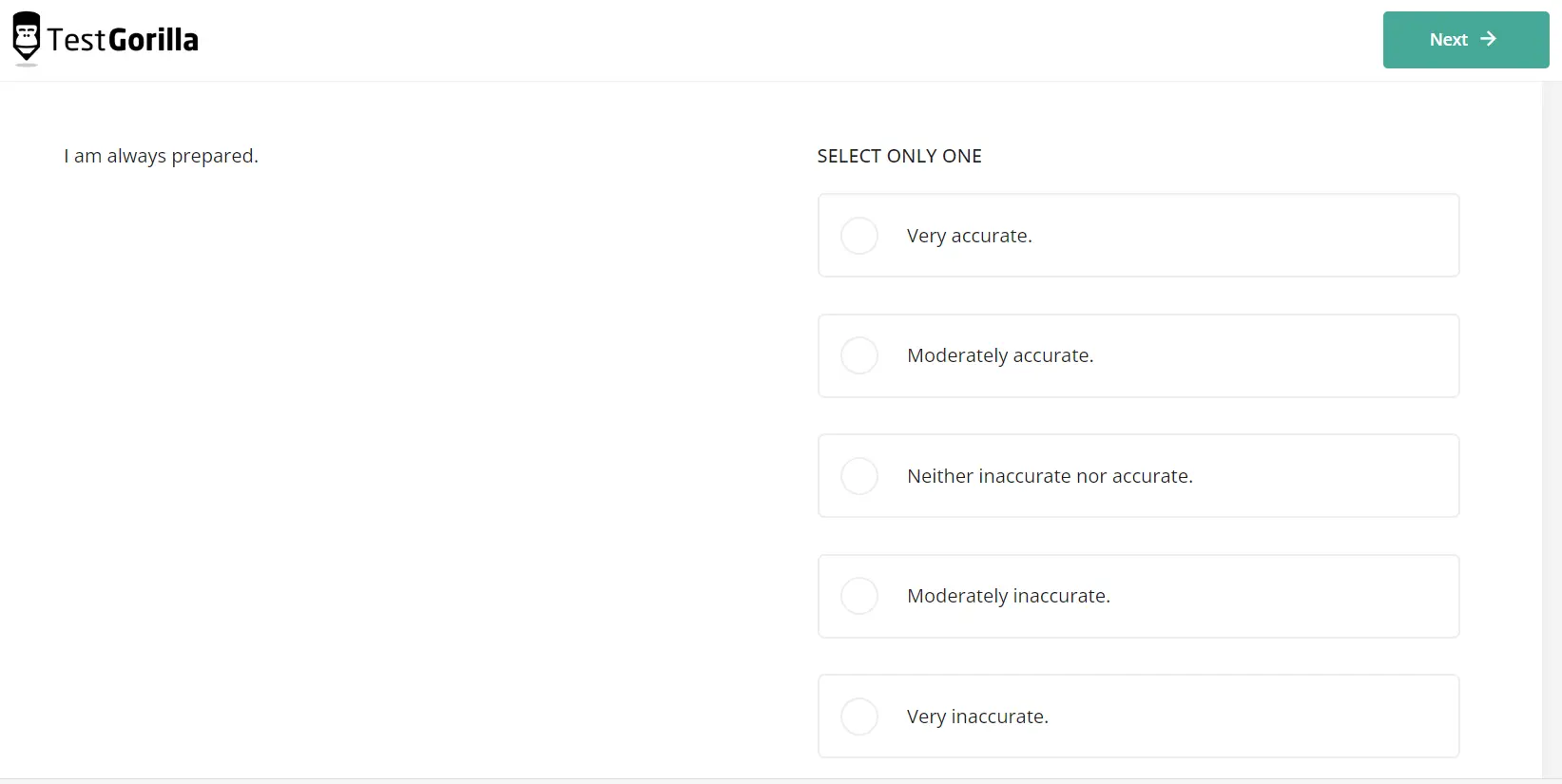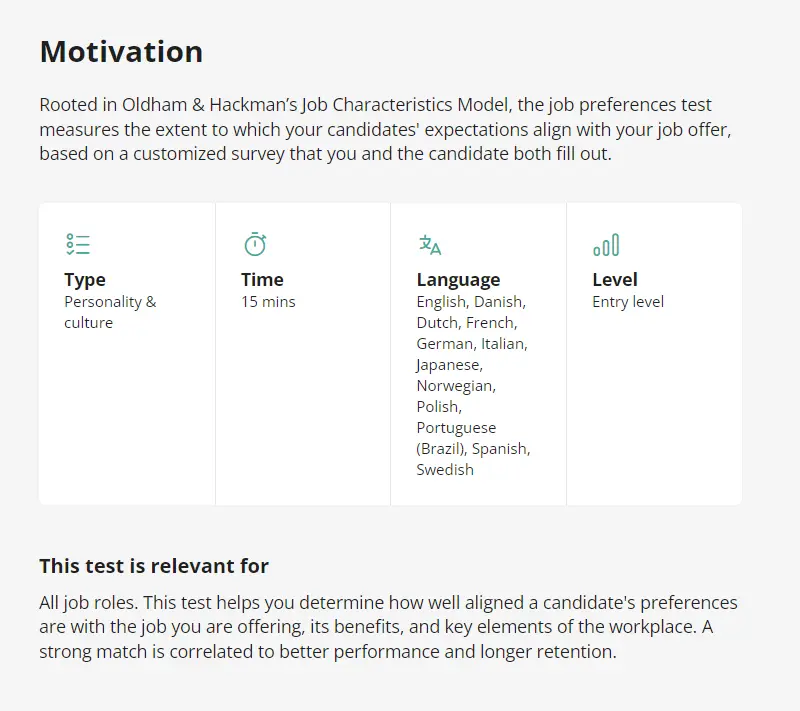How to hire hotel staff: Skills to look for, plus 5 steps and 7 tips for efficient recruitment
The primary role of hotel staff is to ensure guests have a comfortable experience during their stay at the hotel. These employees interact directly with guests to provide services and maintain a hotel’s image.
That’s why it’s important to understand how to hire hotel staff to improve guest experience and support your hotel’s success.
In this article, we discuss hotel staff’s necessary skills. We also offer a step-by-step approach to streamlining your hotel recruitment strategy and share tips on optimizing the hiring process with talent assessments.
How to hire hotel staff with 8 fundamental hotel staff skills
Hiring hotel staff relies on recognizing skills and traits that help hotel workers provide services efficiently to maintain your organization’s standards and reputation.
Essential hard skills for hotel staff
In the hotel industry, as elsewhere, hard skills complement soft skills.
Here are four important examples; however, remember they depend on the particular job hotel candidates apply for.
Hard skill | Why it’s important |
Cleanliness and hygiene standards | Ensure a high level of hotel cleanliness and guest safety |
Computer literacy | Helps navigate various software and systems used in daily hotel operations |
Quality control | Ensures services and facilities meet established standards and guest expectations |
Inventory management | Helps manage stock levels of supplies, which is important for most hospitality positions |
Essential soft skills for hotel staff
Soft skills are important for hotel staff because human interaction is at the core of the hospitality industry. Research by LinkedIn has found that they are the primary predictor of success in this industry.
Soft skill | Why it’s important |
Interpersonal skills | Create a welcoming hotel environment and help address guest concerns |
Communication skills | Support clear information exchange, which contributes to a better understanding of guest needs and a more personalized service |
Problem-solving skills | Help address and resolve job challenges, which prevents guest dissatisfaction |
Initiative | Supports informed decision-making in unfamiliar situations, which ensures alignment with company policies and standards |
5 steps to hire hotel staff that make your guests feel welcome
Without a solid hotel recruitment strategy, finding candidates with the right skills for your staffing needs can be difficult. Moreover, given the increasing demand for hotel staff and the fall in the unemployment rate in the hospitality industry, the competition for great workers is fierce.
Here are five steps to hiring hotel staff that excel at their job.
1. Define each role and its requirements
Defining each role and the required skills helps candidates understand the expectations and assess their suitability, leading to more qualified applicants.
You can observe current employee’s duties to outline key responsibilities, necessary skills, and desired attributes for each position.
You should also consult with staff in similar roles or direct supervisors and the general manager to gain insights into the essential skills and attributes contributing to better performance to add to your job postings.
For example, a front desk employee should have strong computer literacy (example question below), interpersonal skills, proficiency in multiple languages, and the ability to handle high-pressure situations.
These skills support the direct interaction with guests and the fast-paced nature of the hotel environment.
You can also use our Front Desk Receptionist test to pinpoint these skills and then measure them to find the best candidates.
2. Draft a great job description
A job description tells candidates all they need about the role and helps them decide whether to apply.
A well-crafted job description should outline the role’s responsibilities and requirements and reflect your hotel’s culture and values.
Here’s how you can create a great full-time hospitality job description:
Start with a compelling job title: Use a clear and familiar job title that accurately reflects the role and is easily recognizable in the industry.
Provide a brief overview: Start with a concise summary of the job.
Explain the responsibilities: List the day-to-day tasks to give candidates a clear picture of the job.
Specify the requirements: Include necessary qualifications, such as specific skills or experience. Be realistic to avoid deterring candidates with the right skills who don’t have exhaustive experience or certifications.
Describe the work environment: Offer insight into the hotel’s culture, the team dynamics, and any unique aspects of the working environment.
Include salary range and benefits: Clearly state the salary range and outline specific benefits such as health insurance, retirement plans, paid vacations, staff discounts, and career development programs.
Use inclusive language: Ensure the job description welcomes all candidates to avoid bias.
3. Thoroughly test candidates’ skills
Talent assessments help you evaluate candidates’ skills, abilities, and potential fit for specific hotel jobs through standardized questions or tasks. They give you a sneak peek into how candidates perform in real-life scenarios before hiring staff at a hotel.
TestGorilla’s talent assessments are designed for specific roles and skills, making finding a perfect match for your hotel easier.
The best thing is that you can evaluate your job seekers simultaneously, saving time and creating a standardized hiring process. It even supports hiring temporary hotel staff.
Take McGillicuddy Hospitality, for example. This team of hospitality operations consultants tapped into the TestGorilla toolkit and transformed its hiring process overnight.
Using our talent assessments, the company significantly reduced its time hiring hotel staff and saved 2,000€ ($2,150) for every new hire.
One of the talent assessments this organization used is our Hospitality Skills test, designed to evaluate a candidate’s soft skills, attitude, and judgment in typical hotel staff scenarios.
The test covers general hospitality mindset, time management, problem-solving, guest interaction, leadership, and internal communication. These insights are crucial for front desk staff and guest relations professionals.
If you’re interested in sample questions, check out the Hospitality Skills test preview.
Also, don’t forget to book a live demo to learn how you can use this test and more of our talent assessments when hiring your hotel staff.
4. Hold interviews
After narrowing down potential candidates through talent assessments, holding structured interviews is an essential next step that helps you learn more about candidates’ personalities and understand how they can fit into your team and contribute to your hotel’s success.
It’s important because the hospitality industry faces an employee turnover rate of 7% or 80% more than the national average across all sectors.
You can include some of these questions to learn more about a candidate’s career aspirations:
How do you deal with minor setbacks in your work?
What motivates you to excel in your work?
How do you define success in a hospitality role?
Can you describe how you’ve adapted to changes in past roles and how you handle challenges?
5. Proceed with onboarding and orientation of recruits
Onboarding is the last step of the recruitment process, where you give new employees more information about your company and train them for the role.
Here are some actionable steps you can take to ensure a successful onboarding for new hires:
Send out a welcome package or email explaining what they can expect, including the schedule for their first week, dress code, and any paperwork they need to complete beforehand
Plan a structured first day that includes a warm welcome, an introduction to the team, and a tour of the hotel
Develop a quick training program that covers job responsibilities, necessary cleaning and housekeeping tools, and the hotel’s policies and procedures
Pair a new employee with a more experienced colleague to provide them with a go-to person for questions and guidance
Schedule regular one-on-one meetings between the new hire and their manager to discuss progress and address any concerns
The best insights on HR and recruitment, delivered to your inbox.
Biweekly updates. No spam. Unsubscribe any time.
7 tips to optimize your hotel recruitment strategy
Optimizing your hotel recruitment strategy is key to assembling a great team that goes above and beyond for your hotel’s guests.
Below, you can learn how to hire hospitality staff that adapt to your evolving business needs.
How to hire hotel staff: A summary of the 7 best practices
Tip | Benefits |
1. Advertise for attitude | Attracts candidates with customer-centric soft skills like communication and empathy |
2. Offer flexible work | Appeals to a broader range of applicants, including those with other commitments |
3. Promote unique job perks | Distinguishes your hotel from competitors, making your offers more attractive to top talent |
4. Use employee referrals | Enhances recruitment quality by listening to trustworthy recommendations |
5. Do background checks | Ensures the safety and security of guests and their belongings, protecting your hotel’s reputation |
6. Hire quickly | Captures top talent quickly in a competitive market by focusing on skills |
7. Create an employee retention strategy | Addresses common turnover reasons to improve long-term staff retention and reduce associated costs |
1. Advertise for attitude
Hospitality recruitment can differ from recruitment in other sectors because it’s more important to advertise and hire for good attitude than technical skills.
Our Big 5 (OCEAN) Personality test is the best way to assess these soft skills. The test includes 48 statements that candidates must rate from 1 (very inaccurate) to 5 (very accurate). Here’s an example:
These statements aim to measure candidates across five key personality traits:
Openness
Conscientiousness
Extroversion
Agreeableness
Emotional stability
The answers provide valuable insights into different facets of a candidate’s personality. They help predict their fit within your team and their potential to excel in customer-facing roles in the hospitality industry.
Optimize your hotel recruitment strategy with TestGorilla
Are you ready to optimize your hotel recruitment strategy with TestGorilla’s talent assessments?
2. Offer a flexible work schedule
Although a flexible schedule isn’t possible for most entry-level hotel roles, consider offering staff members a shift schedule that fits better with their other commitments because many have families or other jobs.
For example, many hotel housekeeping staff are working parents. So, offering some leeway around school hours could keep your employees happy.
You can also hire temporary hotel staff for part-time roles or allow employees to swap shifts to fit their needs.
Giving hotel employees options like this can help you get more job applicants. It also promotes employee engagement among your current workers while reducing turnover.
3. Offer unique job perks
Most hospitality jobs offer similar compensation and benefits packages, including an industry-standard salary without health benefits for part-time hourly workers.
You can gain an edge over your competitors by offering unique and helpful staff benefits like:
On-site childcare services
Staff discounts on dining and accommodation
Discounted stays at partner hoteliers worldwide
Monthly “innovation days” where hotel staff can pitch new hospitality ideas
Free financial planning and advice services
Cooking classes with the hotel’s chefs
Keep in mind that these are some ideas you can put into practice. For more ideas of what perks you could offer, ask your existing staff what benefits they’d like to see.
4. Use employee referrals and external recruitment strategies
When an organization is a great workplace, there’s no better recruitment tool than word of mouth.
An employee referral program is an excellent way for your existing staff to recommend potential candidates. You can offer rewards through bonuses or other perks, such as vouchers.
Remember that creating a great working atmosphere and keeping your employees satisfied is the best way to turn them into brand ambassadors. Ask them to post and share stories about why your organization is so great.
5. Don’t overlook background checks
An incident involving the theft of a customer’s private information or belongings can devastate the guest and your reputation.
Data reveals that 39% of people who have committed fraud or theft exhibited some HR-related red flags. A thorough background check reduces this risk, uncovering any criminal history indicating theft, fraud, or safety risk.
You should also ensure that your hotel has a strong training program and that everyone understands the rules around data security and dealing with the personal possessions of your guests.
6. Move fast
The hospitality market moves fast, and many individuals take the first job offered to them. You can’t afford to hang around and wait for the perfect candidate.
The speed of recruiting hotel staff can be the difference between landing your ideal employee and losing them to a faster-moving competitor.
The best option is to ditch traditional resumes and use skills-based hiring instead.
Our talent assessments help you streamline your hotel recruitment and focus on what truly matters – finding a candidate with the right skills and attitude.
Skills-based hiring enables you to assess candidates’ practical abilities and competencies directly related to the job.
7. Retain your top performers
Research suggests that hotels lose $5tn annually due to turnover. That’s why you need to develop a good employee retention strategy.
In the interview process, a great way to show your workplace in a good light is to mention how you tackle some of the most common reasons for employee turnover. For example, you can discuss:
Career development: Outline potential career paths in your organization to show candidates there’s room to grow
Competitive compensation: Ensure your pay and benefits are competitive to attract and retain top talent
Work-life balance: Offer flexible scheduling options to help employees balance their personal and professional lives
Recognition programs: Implement regular employee recognition programs to acknowledge and reward hard work and achievements
Positive company culture: Create a supportive and inclusive workplace culture
Referral programs: Encourage current employees to recommend potential candidates to build a sense of trust within your team
Training opportunities: Offer continuous learning and development programs to help employees advance their skills and careers
In addition, you can use our Motivation test to assess a candidate’s goals and aspirations and determine whether they align with the role to help you decide who is in for the long run and avoid losing money.
If you’re wondering how to use this motivation assessment, sign up for a free plan and use this test immediately without any limits.
Hire the best hotel staff with TestGorilla
Hiring the right hotel staff, especially skilled managers, is crucial for providing a stellar guest experience.
Key steps include defining roles, creating compelling job ads, using talent assessments, conducting thorough interviews, and ensuring an effective onboarding process.
If you want to learn more about how to use TestGorilla for your next recruitment strategy, book a live demo.
We also encourage you to take a product tour to explore all the benefits of using our talent assessments.
If you are ready to optimize your recruitment, it’s time to sign up for a free plan and hire hotel staff that delivers great guest experiences.
How to hire hotel staff FAQs
Are you still looking for hotel staffing solutions to ensure guest satisfaction? Find your answers below.
How do I get a hotel employee?
Define the job role and requirements clearly
Post the job on hospitality-focused job boards
Use social media to broaden your search
Consider internal promotions and referrals
Implement the Hospitality Skills tests to evaluate the skills of potential candidates and their fit for the role
Conduct structured interviews and assessments
How do I get kitchen staff?
To get kitchen staff for your hotel, create a detailed job description focused on specific skills and experience required. Advertise the position on culinary job boards and social media platforms targeting professionals in the hospitality industry.
In addition, you can host open days or job fairs at your hotel to attract more potential candidates.
How do you build a team of hotel staff?
You can build a team of hotel staff by identifying the key roles and skills needed to deliver excellent guest service. Prioritize hiring individuals with the required technical skills that align with your hotel's culture and values.
Emphasize teamwork and invest in training and development programs to create a collaborative and supportive work environment.
What are the skills hotel managers should have?
When hiring a hotel manager, you should look for leadership, customer service, financial acumen, and problem-solving skills. They must be effective communicators, adept at managing teams, and capable of making strategic decisions to improve hotel operations.
In addition, you need to hire a hotel manager with a deep understanding of the hospitality industry standards and trends to keep your hotel successful.
How to hire a hotel manager?
Define the role clearly, including responsibilities and expectations
Write an accurate hospitality manager job description
Look for candidates with proven leadership skills
Assess their ability to manage budgets, staff, and customer service excellence
Use talent assessments to understand their problem-solving and decision-making
Check references thoroughly to gauge their past performance and work ethic
How do you interview a hotel manager?
How do you handle difficult guest situations?
Describe your experience with budget management.
How do you motivate and lead your team?
Can you share the name of a successful hotel you led?
How did you contribute to better hotel operations?
How do you stay updated with hospitality trends?
What kind of staff do I need to hire for my hotel?
In the hospitality industry, you must learn how to hire hotel staff, including front desk personnel, housekeepers, kitchen and catering teams, maintenance workers, and hotel managers.
Each role requires specific skills to ensure smooth operations and exceptional guest service. Tailoring your recruitment to find individuals who excel in customer service skills, teamwork, and problem-solving contributes to your hotel’s success.
You've scrolled this far
Why not try TestGorilla for free, and see what happens when you put skills first.


